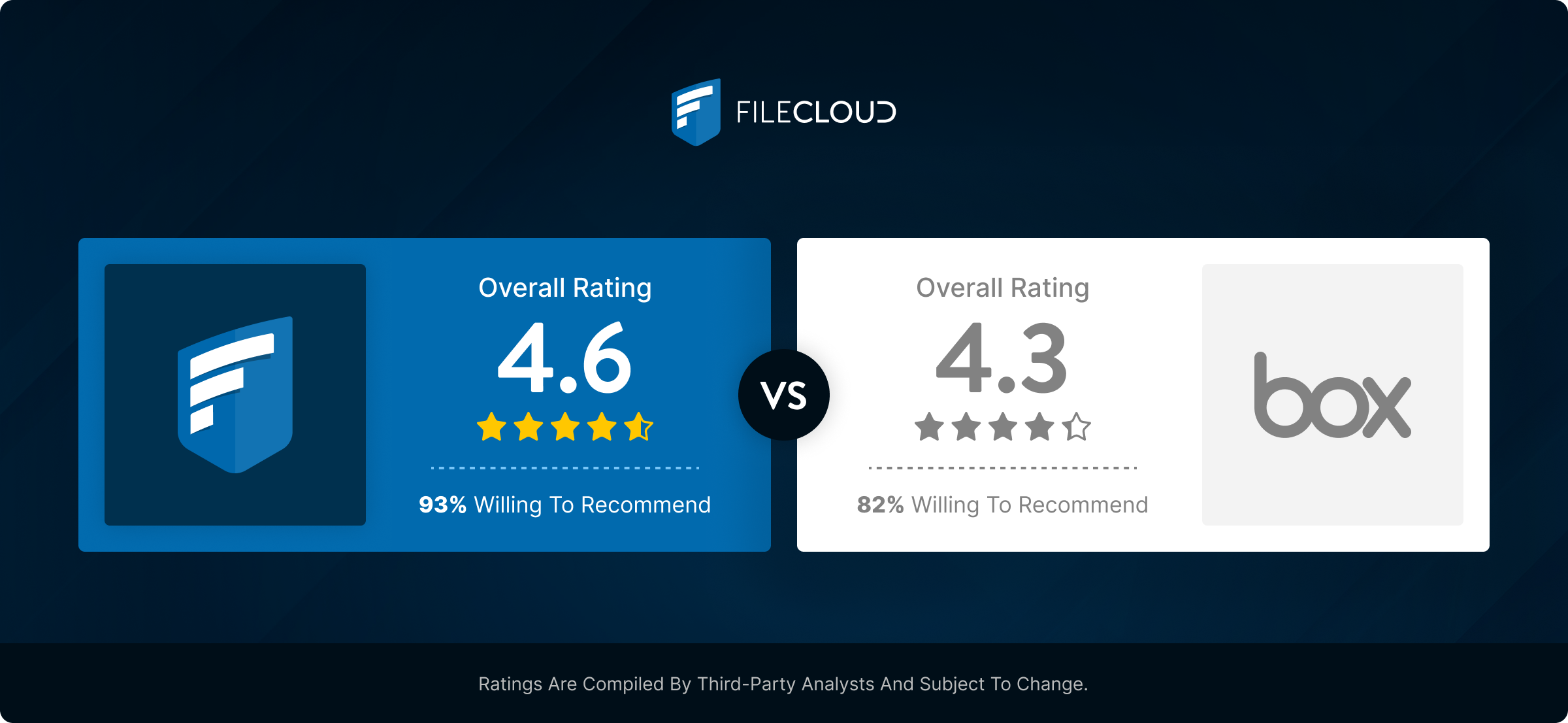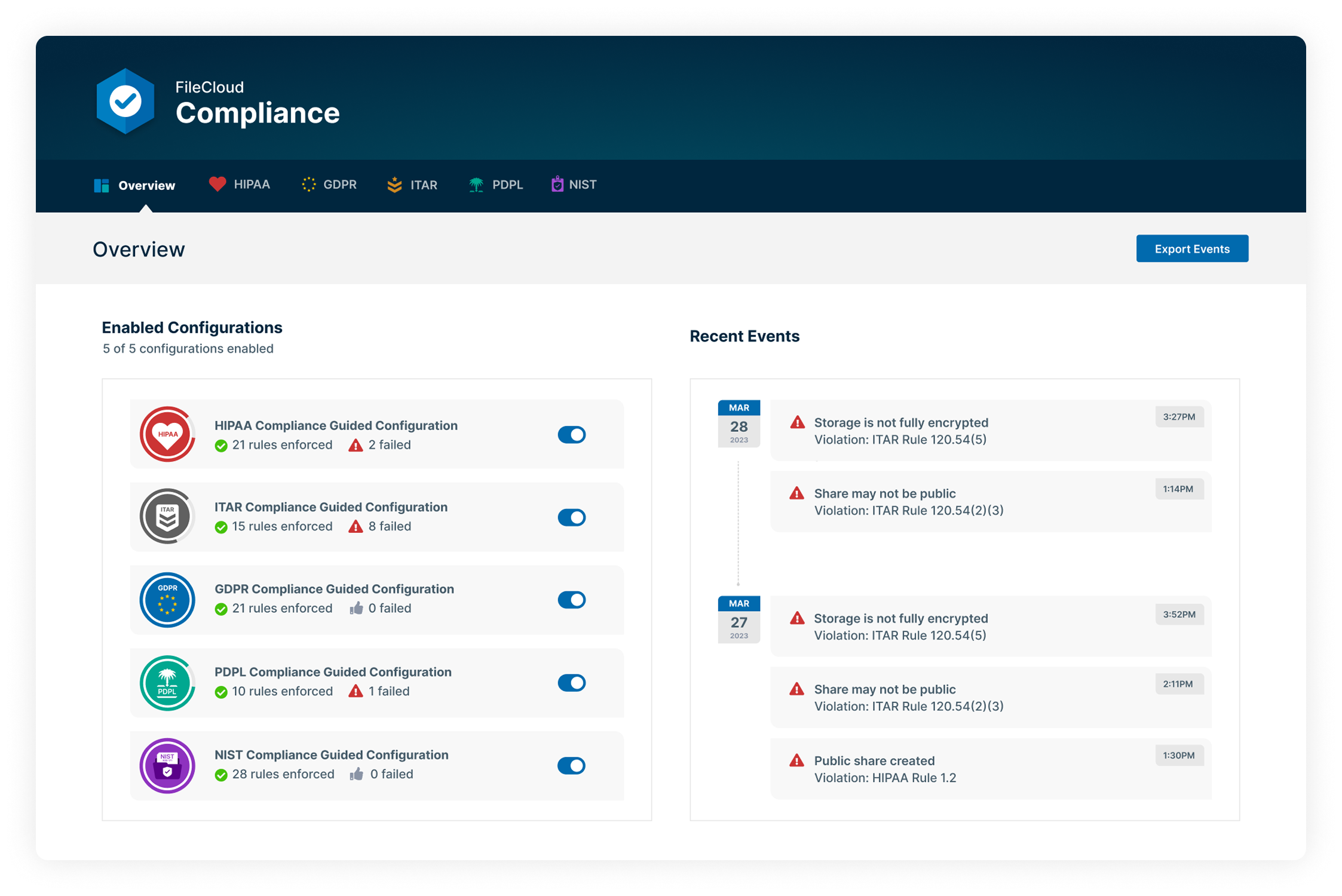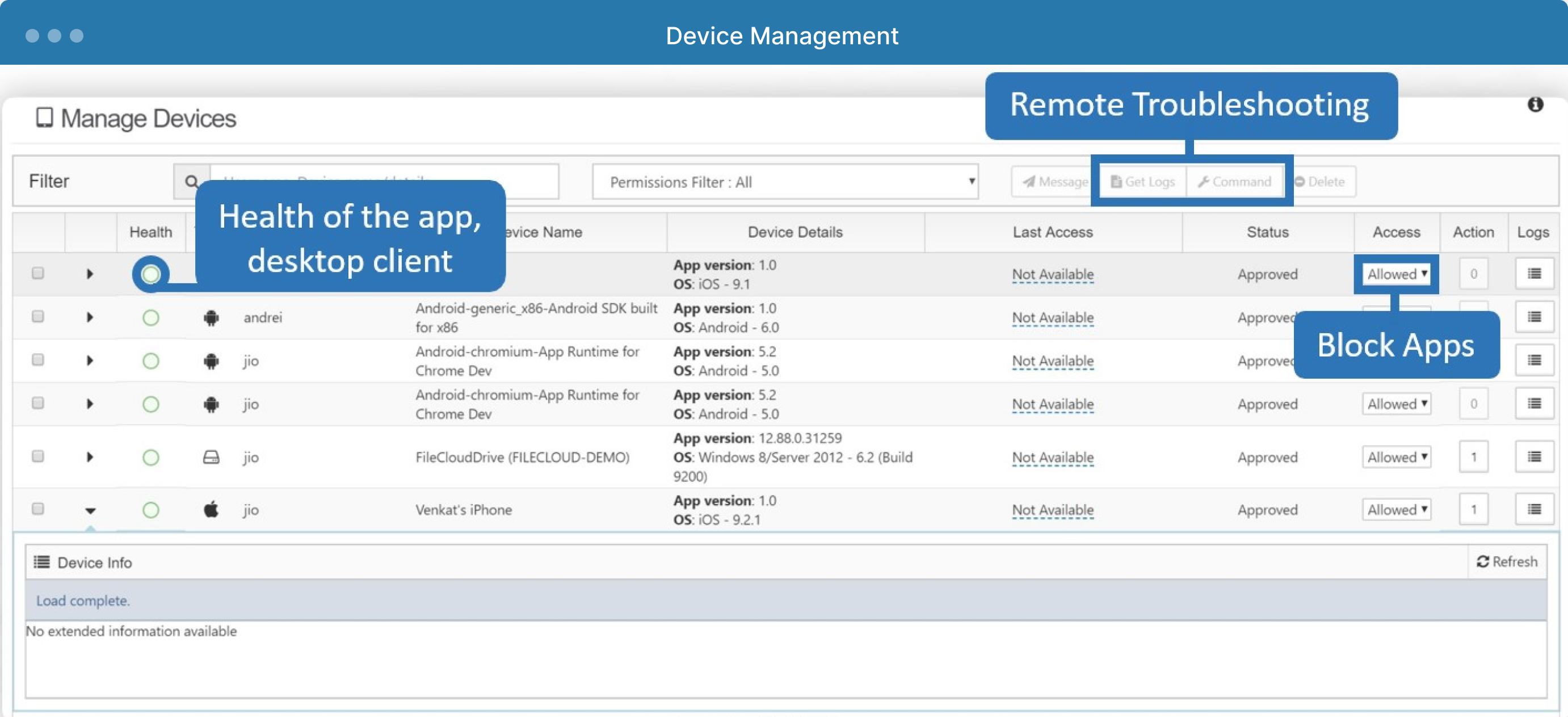FileCloud as a Box Alternative for Enterprise Flexibility
When evaluating enterprise file sharing and sync (EFSS) solutions, IT leaders often find themselves choosing between established cloud providers like Box and innovative alternatives like FileCloud. Both platforms promise secure collaboration, robust admin controls, and enterprise-grade compliance features—but details matter when it comes to long-term enterprise function and scalability.
In this blog post, we'll examine everything from deployment flexibility to security capabilities, providing necessary insights to make an informed decision for enterprise stability.

Box vs FileCloud: Deployment Options
One of FileCloud's strongest differentiators lies in its deployment versatility. While Box operates exclusively as a cloud-based SaaS solution, FileCloud offers IT infrastructure flexibility that many enterprises require:
- Cloud, on-premises, or hybrid deployment options let organizations maintain data exactly according to compliance requirements.
- Powerful API integrations enable seamless connectivity with existing business applications.
- Scalable infrastructure that grows with an organization (without forcing architectural changes).
Box's cloud-only approach works well for organizations comfortable with SaaS solutions, but enterprises with strict data residency requirements or existing on-premises investments may find FileCloud's deployment options more accommodating.

FileCloud vs Box: Admin Capabilities
Administrative efficiency often determines long-term platform success, and this is where FileCloud's value proposition becomes particularly compelling:
FileCloud Advantages:
- Centralized encryption, access controls, and comprehensive audit trails available across all tiers.
- Real-time collaboration with Google Workspace and MS 365 integrations.
- Data visibility through advanced metadata management with custom and built-in tags.
- Workflow automation for improved business process efficiency.
Box Limitations:
- Many advanced administrative features restricted to higher-tier plans.
- External account management limited without an upgrade to Business Plus.
- Workflow automation requires Business-tier upgrades.
- Enterprise-level admin console and RBAC features require upgrade to Business Plus.
For IT administrators managing complex environments, FileCloud often provides necessary controls without forcing expensive tier upgrades.

Box vs FileCloud: Security
Security remains paramount for both solutions, though their approaches differ:
FileCloud Security Strengths:
- Encryption for data at rest and in transit with RBAC support at the Essentials tier.
- Comprehensive audit trails for compliance tracking.
- Centralized IT administration for consistent policy enforcement.
- Data leak prevention (DLP) and digital rights management (DRM) capabilities available as built-in functions.
Box Security Features:
- Strong encryption and access controls.
- Enterprise-grade security certifications.
- Advanced threat detection capabilities.
- Robust access management features.
Both platforms meet basic enterprise security standards, but FileCloud's centralized approach to security administration often simplifies management for IT teams overseeing complex user environments.
More robust security features can be accessed at FileCloud’s Essentials tier compared to the Box Business tier; furthermore, advanced security tools are available in FileCloud by upgrading one tier up (as opposed to Box, which may require several upgrades or even completely outsourcing to third party applications).

FileCloud vs Box: Compliance and Governance
Regulatory compliance can make or break platform adoption in highly regulated industries. FileCloud offers strategic advantages across both the Essentials and the Advanced tiers when compared to Box Business, Business Plus, Enterprise, and Enterprise Plus plans.
FileCloud Compliance Advantages:
- Centralized IT admin with data residency controls.
- Automated content classification and data leak prevention built-in.
- Digital rights management for sensitive document protection.
- Regulatory support accommodating various industry requirements.
Box Compliance Considerations:
As has already been pointed out, some features across security and data governance are available in Box (data residency, RBAC, enterprise admin console, etc.), but they require upgrading to Business Plus or even Enterprise or Enterprise Plus plans. This can create confusion for IT admins and enterprise comptrollers when it comes to licensing and provisioning, with elevated risk for data security or privacy compliance violations.
Organizations with stringent compliance requirements may find FileCloud's approach more cost-effective, as essential governance features aren't locked behind premium pricing tiers. Highly regulated industries can access powerful data controls, governance tools, and compliance resources by upgrading to the Advanced tier (no complicated splicing of features across a broad tier menu).

Box vs FileCloud: Content Management
Content management capabilities often determine daily user experience and operational efficiency:
FileCloud Content Management Strengths:
- Unlimited large file sharing with Enterprise Essentials tier.
- Unlimited file versioning for comprehensive document history.
- Advanced metadata management for improved content organization.
- Robust search and discovery capabilities.
Box Content Management Limitations:
- Large file uploads limited to 5GB at business tiers.
- Unlimited file versioning only available with Enterprise Plus or higher.
- Version control complications for organizations with iterative workflows.
- File size restrictions may limit workflows involving media or technical files.
For organizations regularly handling large files or requiring extensive version control, FileCloud's approach eliminates common workflow bottlenecks that Box's tier restrictions might complicate.

FileCloud vs Box: Collaboration and Sharing
Modern enterprises require seamless collaboration both internally and with external partners:
FileCloud Collaboration Benefits:
- Unlimited external accounts, with comprehensive sharing controls.
- Real-time collaboration integrated with Google Workspace and MS 365.
- Efficient external partner management.
Box Collaboration Constraints:
- Unlimited external accounts only available with Business Plus or higher.
- Advanced collaboration features require tier upgrades.
- External sharing restrictions may limit partner engagement.
Organizations with extensive partner ecosystems or client collaboration requirements often find FileCloud's unrestricted external sharing more cost-effective and user-friendly than Box's tiered approach.

Box vs FileCloud: Remote (Mobile) Access
Remote access capabilities have become essential for distributed teams. Both FileCloud and Box offer similar remote access capabilities, including mobile apps for iOS and Android, offline access and sync, remote device management, and enterprise-grade mobile security policies.
However, all the differences noted above, including security options locked behind upgrade tiers with Box and the unlimited external file sharing with FileCloud can significantly impact user experience for distributed teams working remotely. FileCloud can simplify remote collaboration scenarios involving external partners or clients while enforcing critical security requirements.

Conclusion
The choice between Box and FileCloud ultimately depends on an organization's specific security, compliance, and user requirements, as well as existing IT infrastructure and budget considerations.
FileCloud offers:
- Deployment flexibility (on-premises, cloud, or hybrid).
- Large file sharing and unlimited versioning.
- Extensive external collaboration is a key business requirement
- Enterprise-grade security features without premium tier restrictions.
- Regulatory compliance support and data residency controls.
For many enterprises seeking a Box alternative, FileCloud's combination of deployment flexibility, unrestricted collaboration features, and comprehensive admin controls at lower tiers creates compelling value. The platform eliminates many of the tier-based restrictions that can increase Box's total cost of ownership while providing the security and compliance features IT leaders require.
Ready to see how FileCloud compares in your environment?
Sign up for a free trial to test FileCloud's capabilities with your actual workflows, or schedule a personalized demo to discuss your specific requirements with our enterprise solutions team. Discover how the right file sharing platform can eliminate workflow bottlenecks while strengthening your security posture.
Looking for more competitive insights? Check out our Competitor Series comparing FileCloud with leading enterprise solutions.

Product Marketing Manager